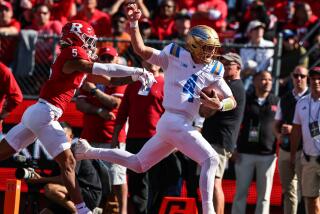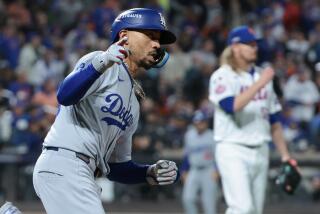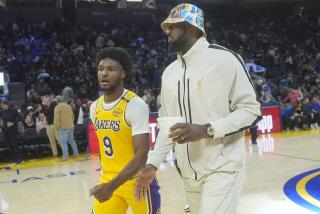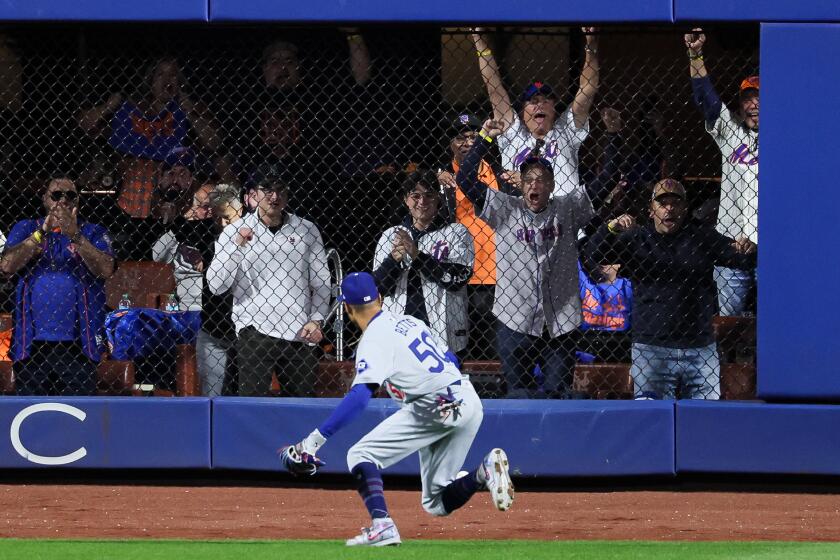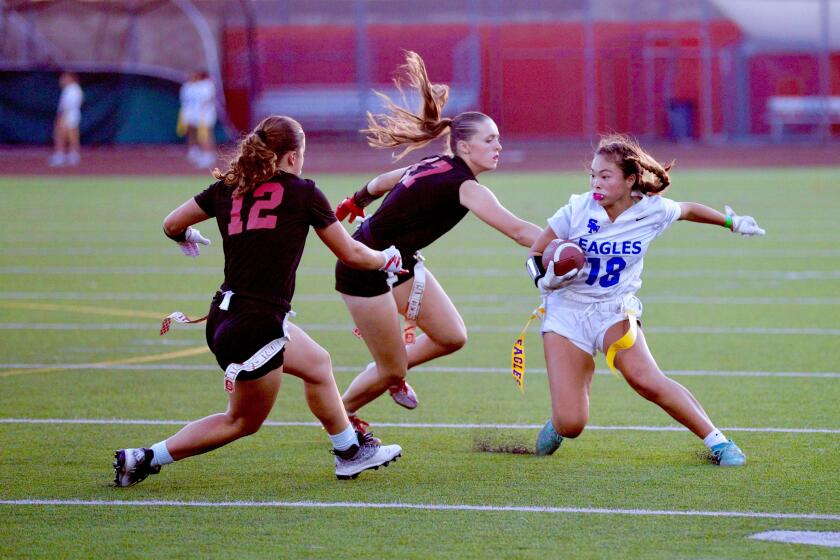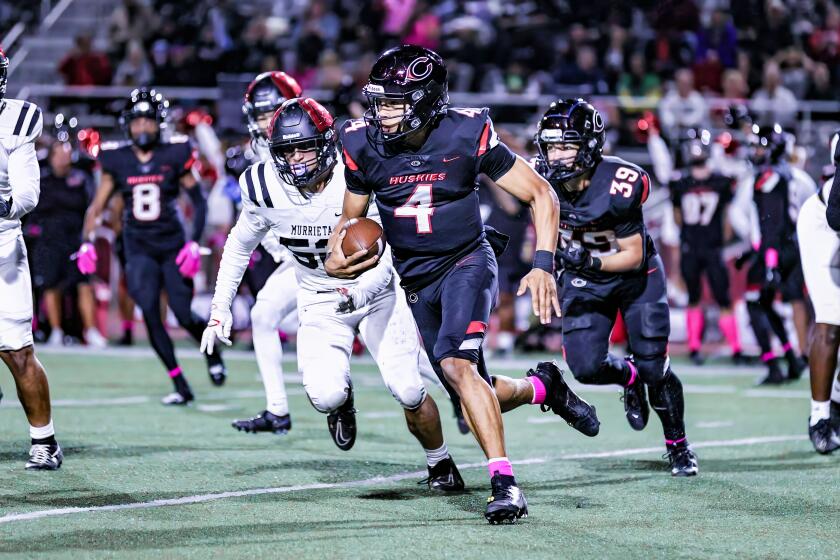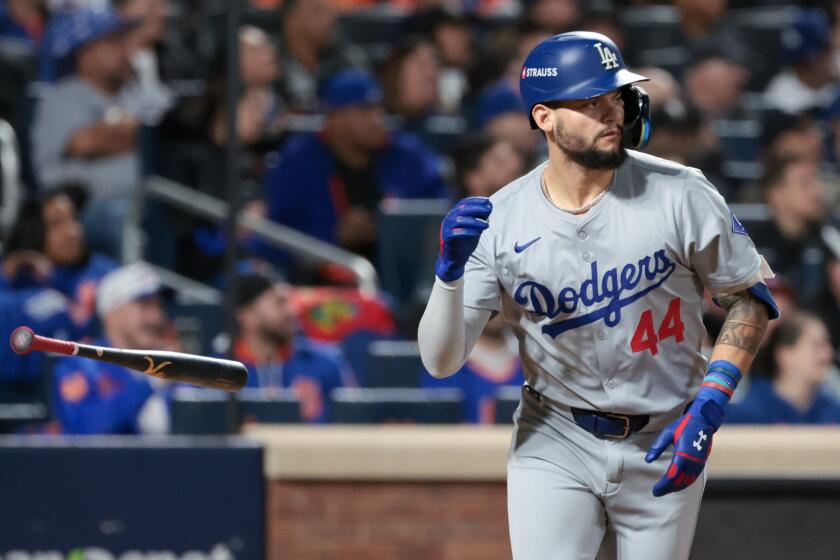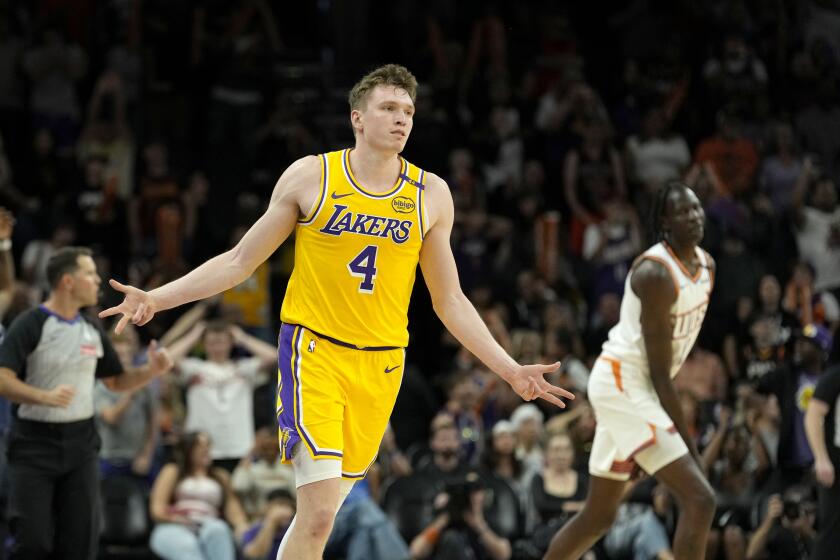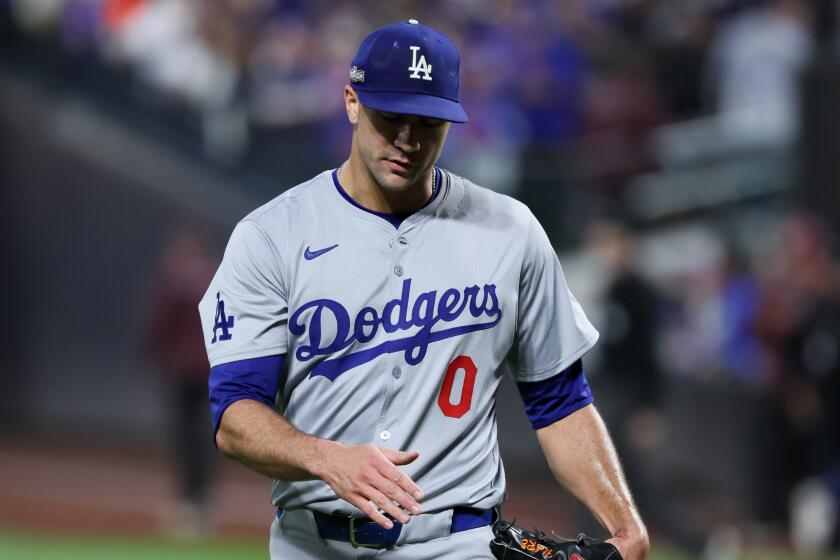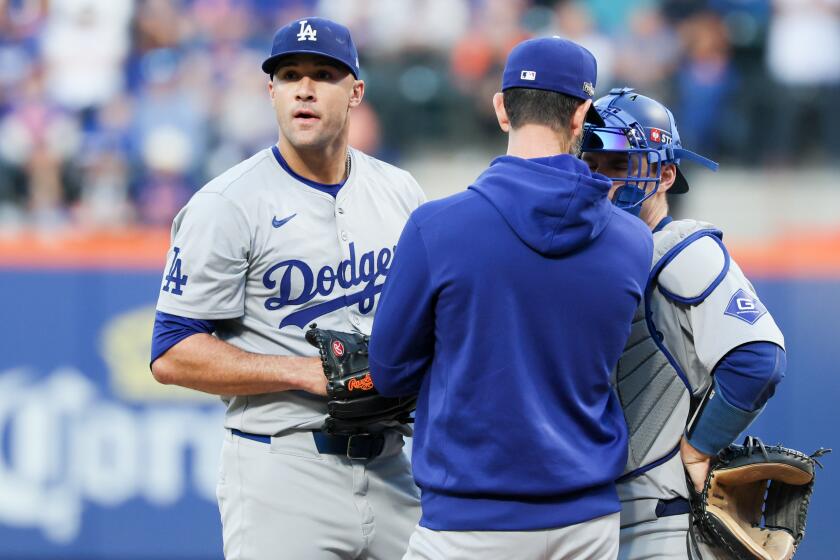From Prima Donna Patrick to the X-Man . . . From Spud to : Manute to Benoit, NBA Rookies Are Finding Their Place : THE FRESHMAN CLASS OF 1985-86
Who is Bob Thornton and what is he doing standing next to Patrick Ewing? For that matter, who are Gerald Wilkins and Fred Cofield? Give up? They are all NBA rookies. They are all New York Knicks and they are all getting the living daylights kicked out of them.
Normally, the word rookie means equality. It cuts across all socioeconomic lines. But Ewing is not normal. He is an extremely rich rookie, the richest of all time in any sport, yet no matter how financially secure Ewing may be, he is still a rookie, and we know what that means.
Adjusting. Man-to-man defenses. Wondering what time “The Transformers” is on television. And there’s more.
Coaches making more money than you. No, it’s not like college at all.
If you’re a Knick rookie, it also means losing a lot of games. The well-paid rookies like Ewing lose the same way that those guys do who are getting the minimum. Eventually, Ewing won’t be losing games all the time. Eventually, he will be a star who plays on a winning team.
Cofield, Thornton and Wilkins may never be stars and they may not last very long in the NBA, although Thornton’s been likened to Bill Laimbeer and Wilkins has been likened to his brother, Dominique, although a smaller version.
The average NBA rookie is making $300,000 this season, the highest average salary ever in the NBA. It may be only fair, since this season’s group of first-year players has been rated as highly as any group that preceded it.
The Knicks have four rookies, which is the same number that the Atlanta Hawks have. Both teams are losing a lot of games. Is this just a coincidence?
It’s still extremely early in the season, but this is a good time to look at all these rookies in the NBA and try to find out what impact they’ve had so far.
If you look at them as a group, the Freshman Class of 1985 has gotten off to quite a start.
AT THE HEAD OF THE CLASS
Patrick Ewing, New York Knicks--The No. 1 pick in the draft is everything he was supposed to be, and more. At the same time, the Knicks are everything they were supposed to be, and less. Much less. This is the sad state of affairs that Patrick Ewing finds himself in.
As good as Ewing is, he can’t do it alone, no matter how much the Knicks are paying him. The tab comes to a tidy $1.2 million this season, in salary, bonuses and incentives. His contract covers 10 years and is worth a reported $31.2 million with the first six years and $17 million guaranteed. Consider these numbers and you may be able to see why more than a few NBA general managers would like to get their hands on the Knicks’ GM Dave DeBusschere.
The problem was that DeBusschere would spend as much of Gulf & Western’s money as he needed just to get his hands on Ewing. Of course, to guarantee a rookie $17 million before he has played a single game might be a little too heavy for most teams, but there seems to be no disagreement about the product the Knicks spend all that money on.
Because of injuries to key players and some front office mismanagement of personnel, Ewing represents just about all of the Knicks’ attack. He leads the Knicks in shots, shot attempts, free throws, free-throw attempts, offensive rebounds, defensive rebounds, turnovers, blocked shots, points and scoring average.
Ewing has played hurt and now he is playing tired. There have been a couple of occasions when he signaled for Coach Hubie Brown to take him out, at which time Brown has to restrain himself from charging out on the court to revive his young superstar. Clearly, the Knicks are unable to play up to Ewing’s level. There is a tremendous gap between Ewing and the rest of the Knicks. Ewing likes to keep to himself.
Teammate Ken Bannister, who is called The Animal, tried to pin a nickname on Ewing. Bannister began referring to Ewing as “the Beast.” Ewing quickly rejected the name.
“ My name is Patrick,” he said.
In the meantime, the New York Post ran a variation on the same theme after Ewing declined to do an interview with one of the newspaper’s reporters.
Prima Donna Patrick. It should be noted that The Post is also the same publication which changed the name of Madison Square Garden to St. Patrick’s Cathedral.
Ewing’s rather tenuous relationship with the press hasn’t really improved with age and probably won’t. The Knicks schedule press conferences for Ewing when the team arrives in each city on the road, as long as it isn’t the same day as a game. Ewing has done them all, except for Seattle when he said he was too tired, even if his answers are one-word, one-sentence or just plain bad.
Ewing almost never signs autographs for adults, but he rarely turns down kids. He shakes hands if he doesn’t want to sign his name.
Ewing has to get most of his points on his own. He scores on offensive rebounds and on the break, because he gets out and runs. Ewing also does not benefit because the Knicks don’t have a true point guard.
The upside to all the Knicks’ injuries is that Ewing might even be developing quicker because everyone else is hurt. Ewing has grown up and learned faster because he’s about the only player the Knicks have. Few suspected he would be the offense, which runs basically around him.
Ewing’s best shot is a short jumper, although his one-handed flying-down-the-baseline dunks strike terror in the hearts of defenders. His defense is rated much better than most rookies because he can intimidate drivers, block a few shots and not foul out too often.
But a disturbing question remains for this freshman class president. Before this season, Ewing had lost 28 games in his entire life, high school and college. The Knicks are going to reach that level pretty soon. How will losing on a regular basis affect Ewing?
“We’re not a team of losers,” he said. “We’re just not winning right now.”
Xavier McDaniel, Seattle Super Sonics--It took McDaniel three games to work his way into the starting lineup and the way he is playing, it may take him several years to get out of it. Like the Knicks, the Super Sonics are not a powerhouse, but McDaniel is already the best player on the team.
“If Ewing wasn’t out this year, X would win the Rookie of the Year Award,” said Morris Buckwalter, the assistant coach of the Portland Trail Blazers.
He may be right. McDaniel clearly ranks up there, at least in the salary department. McDaniel makes $525,000 this season, but his four-year contract is for $3.05 million.
Maybe this is what the Super Sonics had in mind when they designed the cover of their media guide: A hand coming out of a black background that stuffs a ball into a hoop. The backboard is a big, white X. The X marks the spot. The X is for Xavier. He is the X-Man.
In his senior year at Wichita State University, the 6-8 McDaniel became th first player in NCAA history to lead the nation in both scoring (27.2) and rebounding (14.8). He was so good, the Shockers even retired his jersey No. 34.
McDaniel is what the NBA people call explosive, especially around the hoop. He is known as a rebounder and a strong offensive player inside who can also shoot the 15-foot turnaround jumper.
The Super Sonics knew on the second day of training camp that McDaniel wasn’t someone to fool around with. X-Man picked a fight with veteran Reggie King, who apparently was playing him too close. The fight lasted one punch. X-Man threw it. King was soon to be cut.
PASSING GRADES
A. C. Green, Lakers--Jerry West thinks the best thing about A. C. Green, besides that the Lakers have him, is that he rarely blunders. This is very un-rookie-like behavior, especially from one who was the 23rd player chosen in the draft.
“I thought he’d be taken for sure,” said West, who fooled other NBA teams by saying all along that the Lakers would draft Dwayne McClain and instead took Green, the player they wanted all along.
“We felt so confident in A. C.’s ability,” West said. “Of course, you never know what rookies will be like, but he just doesn’t make mistakes.”
In the early going, Green is much more accomplished defensively than on offense, which is just the opposite of the rookie norm. But Green’s offense stagnated in the Oregon State system, so there is still some question whether he can score one-on-one.
“He almost appeared timid at times,” West said of Green’s offense in college. “But he was in a team-type system. With us he plays a simple game. He doesn’t get into foul trouble, which most rookies do and he’s an active, moving kind of player.”
Laker Coach Pat Riley brings Green off the bench and substitutes him for James Worthy, usually in the first quarter, and perhaps more than anything else, that shows the depth of the Lakers’ confidence in Green.
“I knew I wouldn’t be a failure,” Green said.
The Lakers didn’t really know he’d be this good, either.
Wayman Tisdale, Indiana Pacers--After reporting to training camp, then heading back home on the same day because of a contract hassle, then finally signing, then not being in shape, then not playing much, then playing when somebody got hurt, then not playing very well, this is the story of Wayman Tisdale.
And to think he left school a year early for this. Plus a first-year salary of $987,500, of course. Tisdale has not yet set the world on fire, or even Indianapolis, but it’s only a matter of time. At the present, Tisdale sounds confused and feeling more than a little pressure.
“There’s so much pressure to perform right away,” he said. “If it doesn’t come right away, you’re looked down upon. The reason why there’s pressure is because we’re getting paid a lot of money. You get paid big money and they throw those ages out the door.”
Tisdale is 21.
“I really haven’t figured it all out yet in the NBA,” he said. “I have so much to learn. I had to change position from center to forward, I have to learn to move without the ball and get open and I have to learn the passing game we run.”
That’s an awful lot of homework for a rookie, but Tisdale is going to master his assignment somewhere, whether it’s in Indiana or somewhere else. First, they have to decide what position he plays. Some critics say Tisdale is a center trying to play big forward who is actually the size of a small forward.
“You just can’t judge a rookie off his first year,” said Laker General Manager Jerry West. “I don’t care what they do. You have to wait and wait and then wait some more.”
In Indiana, they’re waiting on Wayman. And he knows it.
“It’ll come soon,” he said.
Karl Malone, Utah Jazz--Xavier McDaniel means to Seattle, what Malone means to the Jazz, especially now that it needs more offense with Darrell Griffith out.
Malone became know as the Mail Man at Louisiana Tech, because he always delivered. So far in Salt Lake City, Malone is delivering, too, but only when he stays out of foul trouble. He has most of his trouble defensively, but he would probably show much more if they ran plays for him instead of Adrian Dantley all the time.
The only other thing you should know about Malone is his truck. The entire engine is chrome. It has a 300-watt stereo system. It has a racing wheel. It has a double roll bar. It has 10 halogen lights. It has 40-inch tires, a radar detector, a burglar alarm and three words written in silver script on the doors: The Mail Man.
What does Malone do with his truck?
“I just drive it,” he said.
Malone should go a long way, with or without his truck.
Terry Porter, Portland Trail Blazers--One of the best-kept secrets in the draft is this 6-3 defensive whiz from the University of Wisconsin-Stevens Point. Even though Terry Porter played at an NAIA school, there was a lot of interest in him at draft time. The Bulls thought about taking him with the No. 11 pick, but Porter slipped all the way to No. 24, the last pick of the second round, where Coach Jack Ramsay snapped him up even though he already had two other point guards.
“We were amazed he would still be there,” Ramsay said. “He’s such a hard-nosed defender, a tough kid who doesn’t back down from anybody. He has a good sense for the offensive game and he can make the open shot.”
Porter doesn’t have blinding speed, but he’s certainly adequate. In fact, the Trail Blazers are talking about trading veteran point guard Darnell Valentine to create more playing time for Porter.
“I was kind of a sleeper in the draft,” Porter said. “I was from a small school and the questions were about whether I played with top-notch players. I understand all that. But I’m not worried. I just let it all happen. We’ll see what’s next.
Chris Mullin, Golden State and Jon Koncak, Atlanta--By now, we know that Chris Mullin signed for $500,000 and Jon Koncak signed for $475,000. Koncak signed early and Mullin signed late. Koncak is a center who can score, but fouls a lot and Mullin is a guard or forward who can score but doesn’t run very well.
But we don’t know how they will do in the NBA, although many feel Mullin is a potential star of the future, kind of a smallish John Havlicek, whose No. 17 Mullin wears with the Warriors.
“He just knows how to play,” West said. “He always knows how to get open. He’s not blessed with blinding speed, but he’s unselfish and he can really shoot the ball.”
Koncak, who is 7-0 and 250 pounds, looks like the Hawks’ starting center, which is a somewhat more modest goal than being a star of the future. Already, Koncak has shot nearly as many free throws as Tree Rollins did all last season. Koncak is regarded as a late-bloomer who was helped tremendously by Bobby Knight during the Olympics.
BAD GRADES
(DETENTION HALL)
Benoit Benjamin, Clippers--This is all subject to change, mind you, but Gentle Ben isn’t doing very well right now.
Here’s what Coach Don Chaney said about Benjamin on Nov. 20: “Right now, he’s fundamentally very weak.”
Six days later, Benjamin became the Clippers’ starting center.
What happened?
Benjamin didn’t suddenly get better, but the Clippers must have figured they could lose just as well with Benjamin as they could lose with James Donaldson, plus they wouldn’t have to pay Donaldson’s salary once they got rid of him.
Benjamin just turned 21, but he acts much younger. The Clippers made sure he can act very rich. Benjamin makes $575,000 this year, but his four-year contract is worth $3.2 million. They have put an untested rookie in the most important position on the team. And so far, Benjamin hasn’t responded, although he certainly has the physical attributes to do it.
“I think Benjamin will be a very good player,” Milwaukee Coach Don Nelson said. “And he had better be, considering what they are paying him.”
Alfrederick Hughes, San Antonio--Not everyone was impressed with the Spurs’ first-round pick. Bob Ryan of the Boston Globe called Alfrederick a “CBA-lifer.” The Spurs do not agree.
“He was the 14th pick and he plays as well as the second pick (Tisdale),” Coach Cotton Fitzsimmons said.
One thing Hughes does not do is drive his car as well as anybody you could pick. On his way to San Antonio from Chicago for training camp, Hughes attracted a fleet of six Missouri Highway Patrolmen who set up a roadblock when they noticed that Hughes was driving 128 miles an hour in his late-model Mercedes.
Then when Alfrederick finally got to camp in San Antonio, trouble was right on his heels. He spun out on some gravel and hit a retaining wall on a freeway.
Fitzsimmons, who is trying to make Hughes into an off-guard, said he knows there is one position Hughes will never have.
“Well, we won’t let him be any driver-ed instructor,” Fitzsimmons said. “We have society to worry about.”
Alfrederick doesn’t worry very much. He feels no pressure right now, just as long as he sticks to the road.
“I’m in a situation where I don’t have to come in and produce right away,” he said. “Anytime I do anything, it’s icing on the cake.”
The rest of the rookies getting bad grades are answers to multiple choice questions. They are in detention hall because they have either, a) played badly in limited time, b) not played at all, c) played on losing teams, d) made you wonder why they were even drafted, or e) all of the above.
These players are Joe Kleine of Sacramento, Blair Rasmussen of Denver, Steve Harris of Houston, Charles Oakley of Chicago and Tyrone Corbin of San Antonio, Jerry Reynolds of Milwaukee, Kenny Green of Washington, Joe Dumars of Detroit, Terry Catledge of Philadelphia and Ed Pinckney of Phoenix.
FOREIGN EXCHANGE STUDENTS
The All-Foreign born team is Georgi Glouchkov of Phoenix (Bulgaria), Uwe Blab (West Germany), Detlef Schrempf (West Germany) and Bill Wennington (Canada) of Dallas.
In Phoenix, Air Georgi is still grounded, but the Suns are sending a portion of his paychecks to a Swiss bank. Only on the Suns could a guy be shooting less than 40% and still have three other guys worse than that.
In Dallas, the Mavericks seem to have cornered the market in foreign-born students. Schrempf, who they hope amounts to something like Rick Barry, makes $290,000, which is more than Blab and Wennington.
There are also more hopes for Schrempf than the other two.
“Some people are already comparing him to Rick Barry and John Havlicek and Magic,” Dallas Coach Dick Motta said. “Those comparisons are a little much at this time. I’d like to compare him to Mitch Kupchak or Jerry Sloan. If he follows those two, he’s the third most hustling player that I’ve coached.”
Blab may never be anything more than a backup center, but he is 7-2, 250 pounds and works hard, so he has a chance. At 7-0, Wennington turned out to be too short to play center, so the Mavericks are trying to make him a power forward.
LATE ENROLLMENT Here is a list of the five rookies who are the lowest-drafted players still remaining on their team’s active rosters. It’s fairly unusual for any player drafted after the first round to make an NBA team, but these guys beat the odds. Not one of them was drafted before the fourth round.
The players are ranked according to the number of their selection in the draft.
No. 84, 4th round, John Battle, Rutgers, by Atlanta.
No. 87, 4th round, Spud Webb, N. C. State, by Detroit.
No. 89, 4th round, Pete Williams, Arizona, by Denver.
No. 144, 7th round, Michael Phelps, Alcorn State, by Seattle.
No. 148, 7th round, Georgi Glouchkov, Bulgaria, by Phoenix.
IN A CLASS BY THEMSELVES Manute Bol, Washington Bullets--Pretty soon now, Manute Bol will learn how to drive a car and he won’t have to hitch rides with friends. If only he could learn how to eat. Or at least gain some weight. If he does, maybe he won’t look like 7-7 of skin and bones.
Bol is probably the most interesting player in the freshman class, judged solely on how tall he is and what that height could mean to the Bullets if he ever weighed more than 250 pounds. When the Bullets drafted Bol, he weighed 192 and he’s up to 208. That’s not going to be nearly enough, the experts believe.
“He’s definitely got a unique ability to block shots, but he just has to have the physical attribute of more weight,” Laker General Manager Jerry West said. “He has to be bigger. A player cannot play when he’s going to constantly be knocked off balance.”
The Bullets have hired someone to cook for Bol, but besides strength training, they are still baffled how to get Bol to gain weight quicker. They contacted Dallas Mavericks General Manager Norm Sonju for help.
“We suggested he spend a summer with Frank Layden,” Sonju said.
Bol is getting a little tired about all the skinny jokes being made about him. He gets more media attention than any other Bullet player and probably more than any rookie in the league except for Ewing. Last week, he was asked to be taped for a weekend network television piece on what he did away from the court. Bol was going out to eat with Chuck Douglas, a member of the Bullets’ public relations staff, who acts as a kind of chauffeur for Bol and they planned to dine at Burger King.
Bol didn’t want to appear to be some sort of Wimpy character who only ate hamburgers. The network pleaded. Bol relented. So there they were, Douglas behind the wheel and Bol in the back seat (because he can’t fit in the front seat), stopped in the drive-through lane at Burger King.
The Bullets are trying to get Bol his own specially-equipped car, once he gets his driver’s license. Bol’s front seat will be where the back seat should be. On airplanes, Bol occupies the first row aisle seat in first class so he can stretch his legs. This is popularly known in the NBA as “Kareem’s Seat” because Abdul-Jabbar always has the same seat assignment for leg room.
Speaking of legs, Bol’s inseam is 51 inches long. The first time he saw Bol, the Knicks’ Ernie Grunfeld peeked beneath Bol’s warmup pants to see if he was on stilts. When teammate Frank Johnson, who is 6-2, tried on Bol’s warmup pants, they came up to Johnson’s neck.
Bol took his first trip to the tailor’s on a recent Bullet trip to New York. Bol bought a couple of sports coats and suits so he could conform to the team’s dress code for the road.
Let’s see now. Bol’s got some new clothes, he’s going to get a driver’s license and then a car. He’s got to be on the road to success, right? Actually, Bol has a very long way to go before he makes much of an impact.
Coach Gene Shue plays Bol less than 10 minutes a game, but Bol is showing a glimmer of why the Bullets drafted him. He has blocked more shots than anyone on the team except for Charles Jones.
Bol is living a life that few of his fellow Sudanese could hope for. The Dinka tribesman who once killed a lion with a spear is already a folk hero in his new country. Perhaps some day he will be a hero because he can play basketball instead of just being tall.
Spud Webb, Atlanta Hawks--At the opposite end of the spectrum, but in the same class as Bol, is this little guy. It is also a little known fact that Anthony (Spud) Webb was a teammate of Manute Bol’s with the Rhode Island Gulls of the United States Basketball League, so they belong together .
Spud is exactly 5-foot-5, which is surprising only because he was listed at 5-7 when Detroit drafted him in the fourth round. That means Spud must have shrunk two inches from the time he was drafted until the time he showed up in Detroit and it is probably the reason why they got rid of him during the summer. At that rate, if the Pistons had waited until this fall, he might have been down to almost nothing.
Webb is probably the only player in the NBA named after Sputnik, the Russian reconnaissance satellite. He is also about the same size. Spud is short for Sputnik. But hey, Spud is short for anything . Especially for a basketball player.
How short is he? Well, when North Carolina State Coach Jim Valvano showed up with his assistant coach, who had recruited Webb, to meet Webb at the airport, Valvano thought young Spud has missed the plane.
“He’s not here,” Valvano said.
Just then, the 5-4 Webb walked up to them.
“You’re fired,” Valvano told his assistant coach.
Nobody got fired and Webb got a start on being famous, if not tall. The Pistons took a chance on Webb, but cut him after the Chicago summer league. It just so happened that the Hawks needed a guard because Eddie Johnson was an unsigned free agent and they had not yet signed Ray Williams.
In training camp, Spud quickly earned some points with Hawks Coach Mike Fratello. Webb played an exhibition game one day after he needed 40 stitches to close a cut on his lip.
Both Fratello and General Manager Stan Kasten claim that Spud is more than just an anecdote. Webb has played in every Hawk game and even started a couple of them. He averages about 17 minutes, almost two rebounds and almost four assists each game.
“That little guy is amazing,” said Dominique Wilkins, the Hawks’ star player.
Glenn (Doc) Rivers, who plays guard for the Hawks, was equally as amazed. At first, Rivers wasn’t sure who Webb was. He called Webb “Emmanuel Lewis.” Then Rivers got mixed up again.
“I started to send him out for some towels,” Rivers said. “I thought he was the ball boy.”
Now, if Rivers had thought Webb was the ball , this short stuff would have gone too far. After all, Slater Martin was only 5-9. Think of it this way. Spud is 67 whole inches tall. So what if he only weighs 133 pounds. Kasten believes that Webb will eventually be given his due for his playing ability instead of his shortness, which you may recognize as the downward variation of the Bol Theory.
More to Read
Go beyond the scoreboard
Get the latest on L.A.'s teams in the daily Sports Report newsletter.
You may occasionally receive promotional content from the Los Angeles Times.
